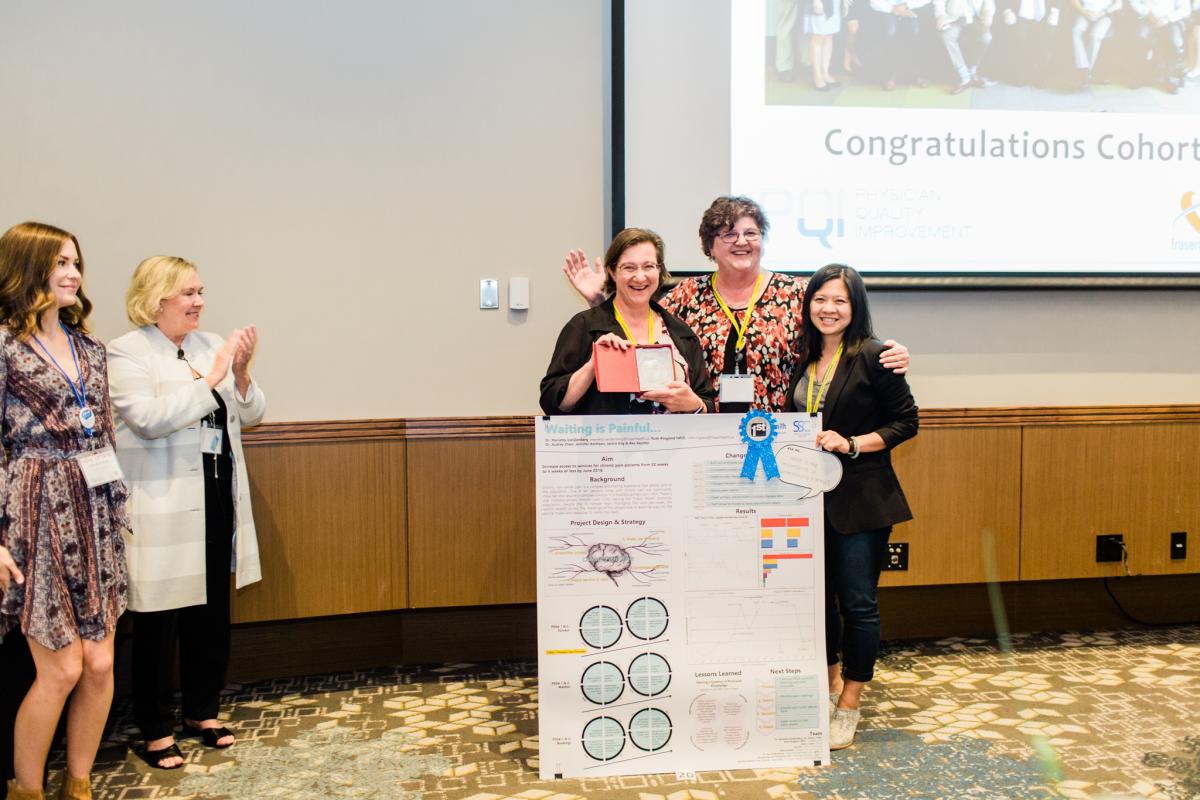 It was at SSC Physician Quality Improvement training session where three health professionals: a nurse practitioner, a psychiatrist and a psychiatrist/pain fellow from Fraser Health, each with distinct backgrounds, passions and interests came together with one common goal: to decrease the waitlist for patients visiting the pain clinic. Currently, the Jim Pattison Outpatient Care and Surgery Centre’s Chronic Pain Clinic is the only multidisciplinary resource for pain management within Fraser Health.
It was at SSC Physician Quality Improvement training session where three health professionals: a nurse practitioner, a psychiatrist and a psychiatrist/pain fellow from Fraser Health, each with distinct backgrounds, passions and interests came together with one common goal: to decrease the waitlist for patients visiting the pain clinic. Currently, the Jim Pattison Outpatient Care and Surgery Centre’s Chronic Pain Clinic is the only multidisciplinary resource for pain management within Fraser Health.
Ruth Ringland, a Nurse Practitioner at the pain clinic came up with the project idea. “My usual work had involved quality assurance, but I was always also interested in quality improvement, because that’s where system change occurs.” Since, PQI projects are physician-led, Ruth partnered on this project with Dr Marietta Van Den Berg, a psychiatrist with an outcome-oriented personality and Audrey Chen, a resident physiatrist, with a visionary personality. “A mix of passion, direction and vision for change”, as they call themselves, they attribute their success to their collaboration along with the skills they gained through the PQI training.
As part of the project, they met with almost all 20 clinic staff to perform a process mapping, a skill acquired at the PQI training session. “We were able to involve everybody in the clinic to work towards a common goal, utilizing each individual’s abilities and skills” said Ruth. They also conducted a survey with both patients and physicians to determine what worked and what needed improvement. “The patient is part of the team, if you make changes, [and] you don’t involve all the team, it’s not going to be successful” said Audrey.
After a PDSA [Plan, Do, Study, Act] exercise, they concluded that decreasing wait times for the clinic was neither an easy nor a linear process, and went well beyond just the clinic. What they found was eye-opening and led them to narrow the scope of their project to ‘enhancing access’ instead. Audrey noted, “When we say change, we don’t know that it carries a cascade of complexities along with it.”
With the changes that were within their reach, they were able to bring the waitlist from about 35 weeks down to six weeks for a sub-group of patients. They were also able to improve a great deal of processes, eliminating duplication and improving efficiency. “Our work stretched over nights, weekends, and over dinners and lunches and we became friends.” said Dr Van Den Berg. With its initial successes, the project became a teaser and got everyone at the clinic thinking about the processes. Further explorations and studies are underway for achieving even bigger results.
Ruth, Marietta and Audrey were among the third PQI cohort (of 22) who graduated from Fraser Health. The program started in April, 2015 and has had 103 graduates from four BC health authorities to date. The graduates include specialist physicians, nurse practitioners and some family physicians. Due to the program being a great hit among the participants, 15 graduates in Fraser Health alone are already supporting PQI trainings either as coach, or as faculty. Jennifer Atchison, Coordinator, Physician Quality Improvement at Fraser Health mentioned, “Even though, it is a large time commitment to attend trainings and complete a project, many physicians express interest in continuing with another project or teaching/coaching new cohort members due to the added benefits.”
Physician Quality Improvement (PQI) is one of nine Specialist Services Committee (SSC) initiatives and provides training through technical resources and expertise to lead quality improvement projects.



